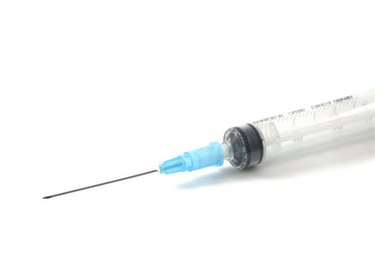
Your doctor may prescribe vitamin B12 injections if you have low levels of B12 in your blood, a condition known as vitamin B12 deficiency. B12 deficiency can result if you don't eat enough of certain foods, particularly meat, poultry and seafood, or if you have an inability to absorb vitamin B12 from food. If your B12 absorption is impaired, you will need to receive injections more frequently than you will if your deficiency is a result of an inadequate diet.
Importance of Vitamin B12
Video of the Day
According to the Office of Dietary Supplements vitamin B12 is vital to the reaction that creates new DNA in your body. This function is particularly important in keeping your red blood cells healthy. With inadequate vitamin B12, your red blood cells can form incorrectly, leading to a condition known as megaloblastic anemia in which your red blood cells are swollen and ineffective. In addition to its role in DNA synthesis, vitamin B12 is necessary for the proper function of your nervous system. The daily recommended intake of vitamin B12 for adults is 2.4 mcg, and you can meet this need through supplementation or by eating a variety of animal products, including milk, meat and seafood.
Video of the Day
Vitamin B12 Deficiency
Vitamin B12 deficiency occurs in 1.5 to 15 percent of the general public. According to a 2008 article in the journal "Blood," it may take 2 to 5 years for clinical symptoms of vitamin B12 deficiency to appear in people with malabsorption disorders such as pernicious anemia or sprue. If you don't eat meat, as in the case of a vegan diet, it may take more than 10 years before signs of deficiency appear. Deficiency is slow to develop because your body is able to store a large amount of vitamin B12 in the liver and other tissues. Symptoms of vitamin B12 deficiency include shakiness, inability to control bodily actions and neurological changes including psychosis or changes in mood.
Dosing of Vitamin B12 Injections
Doctors typically administer injections of vitamin B12 in doses of 1000 mcg. This amount of vitamin B12 corrects the physiological consequences of deficiency and also helps build up body stores of the vitamin. Of this 1000 mcg dose, your body retains approximately 150 mcg or roughly 15 percent. You retain a higher percentage of smaller doses, but the overall amount of vitamin B12 obtained from smaller doses is still less than that stored from a 1000-mcg injection.
Frequency of Vitamin B12 Injections
Owing to your body's ability to store large amounts of vitamin B12, injections may be infrequent once your deficiency is resolved. If you cannot absorb vitamin B12 from food, Dr. Ralph Caramel, author of a 2008 article on vitamin B12 in the journal "Blood," suggests an initial injection cycle of 8 to 10 administrations over the first two to three months, then injections once a month thereafter. If you have low vitamin B12 levels that are due to improper intake, you will need fewer injections, provided you begin to eat foods rich in vitamin B12 more often. Always consult with your doctor or pharmacist regarding how often you should be receiving vitamin B12 injections.
Safety of Vitamin B12 injections
According to the Office of Dietary Supplements, overdosing on vitamin B12 is difficult and no known adverse health effects are associated with high vitamin B12 intakes from either food or supplements. Vitamin B12 can interact with certain medications, however. Check with your doctor or pharmacist about possible interactions these injections may have with other medications you are taking. Though very rare, allergic reactions to vitamin B12 injections have occurred, and switching to an oral preparation of vitamin B12 may help prevent the reaction or reduce its severity.